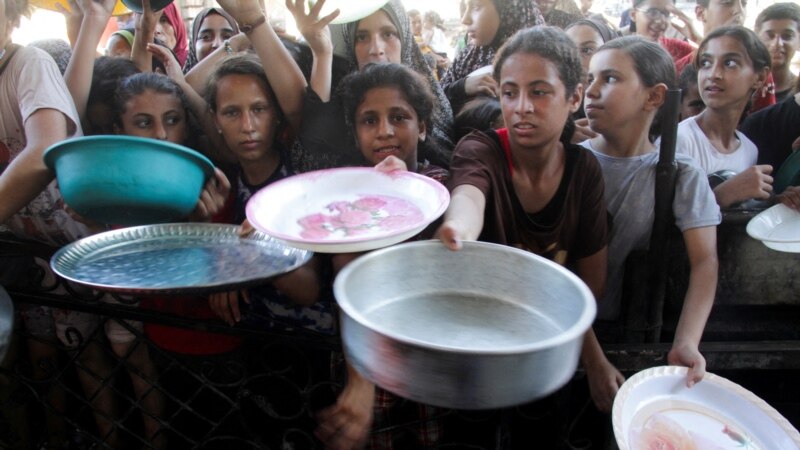UN cites anarchy in Gaza Strip as obstacle to humanitarian aid

GENEVA — U.N. officials warn the Gaza Strip has descended into a state of anarchy, which is obstructing efforts to provide humanitarian assistance to millions of Palestinians in desperate straits.
“Our office has documented alleged unlawful killings of local police and humanitarian workers, and the strangulation of supplies indispensable to the survival of the civilian population. Anarchy is spreading,” said Ajith Sunghay, head of the U.N. Human Rights Office for the Occupied Palestinian Territory.
Speaking from Amman, Jordan, Sunghay, who has just returned from a nine-day visit to Gaza, told journalists in Geneva that conditions have significantly worsened there since his last mission to the Palestinian enclave several weeks ago.
“The people of Gaza are suffering immensely. It truly is desperate. People are on the move from north to south, again, although they are making the journey knowing it is fraught with danger,” he said.
“I saw a motorbike and trailer loaded with personal possessions smoldering on the road. There was nobody,” he said. “But it was clear no one could have survived the strike.”
Gaza’s health ministry said 503 Palestinians have been killed, mostly in central Gaza, since July 12. During that period, the United Nations says three mass casualty incidents have occurred in different parts of Gaza, in which two UNRWA schools were struck, killing nearly 200 Palestinians and injuring hundreds more.
“Israel’s evacuation order on July 9, one of the largest since October 7, has forced families into an impossible choice yet again — stay amid active hostilities or risk fleeing to areas still subject to attack and with hardly any space or services,” said Jeremy Laurence, spokesperson for the U.N. High Commissioner for Human Rights, adding, “Nowhere is safe for people in Gaza.”
Hamas militants brutally attacked Israel on October 7, killing around 1,200 people and taking 250 hostage, which elicited a fierce response from Israel. Some 120 hostages remain in the hands of Hamas in Gaza.
“We are also seeing the outcome of Israel’s dismantling of local capacity to maintain public order and safety,” Laurence said.
“There is looting, mob justice, extortion of money, family disputes, random shootings, fighting for space and resources, and we see youths armed with sticks manning barricades,” he said, adding that those conditions have led to the “entirely foreseeable unraveling of the fabric of society in Gaza.”
Ajith Sunghay called the outcome predictable given the lack of security and a young, large, restive population in Gaza.
“Youth with a lot of energy, not knowing what to do. When the law enforcement has been disbanded, in this scenario, of course, there is looting,” he said. “When people are hungry and there is no law enforcement, there is looting, there is chaos, there is anarchy.”
He stressed that attention had to be paid to the “extremely dangerous” situation. “We want the police to be brought back on the streets and to bring some order there.”
The United Nations and aid groups accuse Israel of closing most of the border crossings into Gaza — and of preventing lifesaving relief supplies from reaching the more than 2 million people in dire need.
The U.N.’s Office for the Coordination of Humanitarian Affairs (OCHA) says “active conflict, access constraints, fuel restrictions, the ongoing power blackout, the lack of public order and safety, and other challenges continue to impede the delivery of lifesaving humanitarian assistance to civilians in Gaza.”
“It is still extremely difficult to access areas north of Wadi Gaza, which requires coordination with the Israeli authorities and passage through an Israeli checkpoint,” an agency official said.
Israeli authorities reject the accusations, saying that aid is piling up on the Gaza side of the border crossings and that the U.N. is not collecting and distributing the relief supplies inside Gaza.
Israeli Colonel Elad Goren blames the U.N. for “not increasing its capabilities.”
“The crossings can move more goods. We can scan more trucks. We can move more aid into Gaza. This is not the bottleneck,” he said. “Israel and the security screenings are in no way the obstacle of humanitarian aid entering Gaza.”
UNICEF spokesperson James Elder is not persuaded by that argument. “There has been and there is an intentional restriction of aid going in,” he said, noting that supplies are coming into Gaza only through “one single road,” the Kerem Shalom crossing, and that “that is done deliberately.”
“It is the legal responsibility of Israel not just to facilitate aid getting into Gaza but to facilitate the safe distribution of that aid. None of these things have been happening for nine months,” he said, adding that the delivery of aid has nothing to do with “inefficiencies on the ground.”
“What there are, is disease on the ground, bombs from the sky and a deliberate, consistent unwillingness on the part of the authorities who have the legal and military power to prevent lifesaving aid from going into Gaza,” he said.
